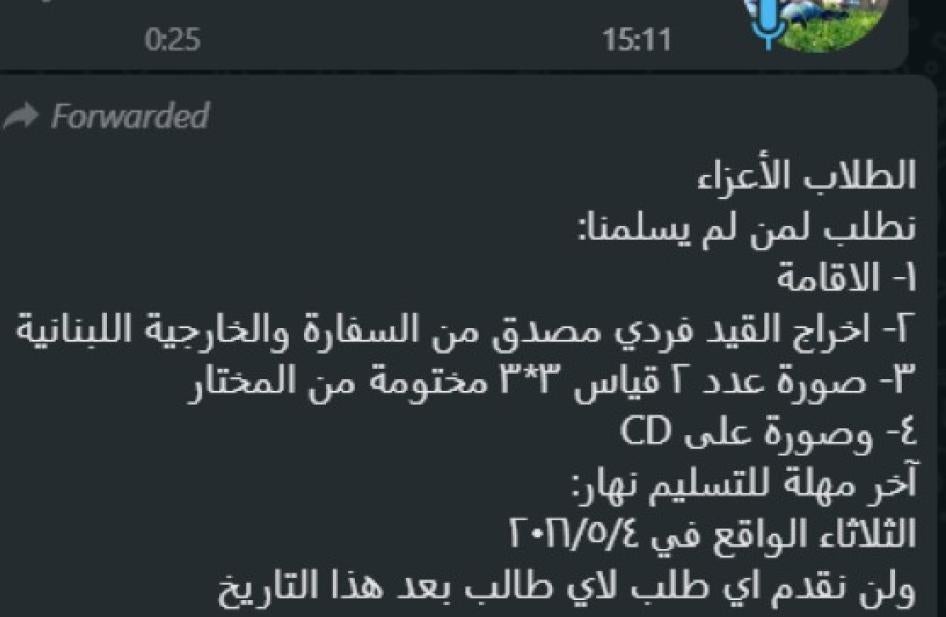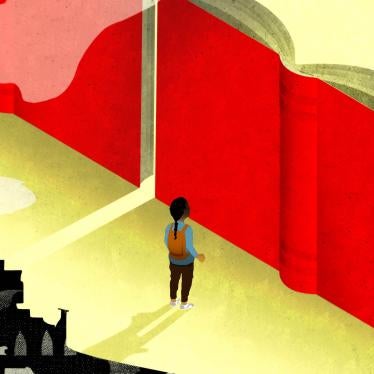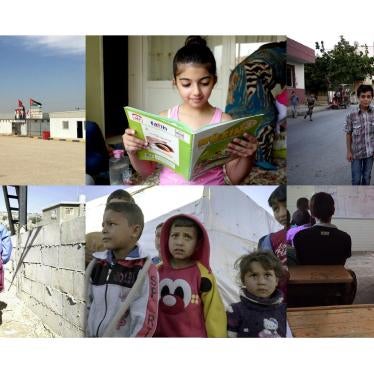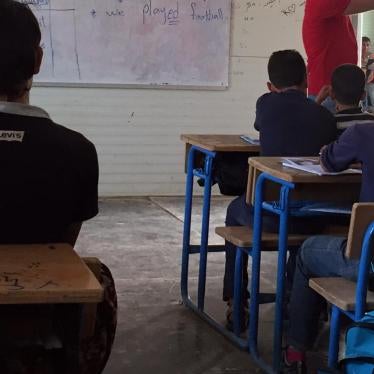Update: On May 6, 2021, the education minister announced he had requested the government to allow refugee children without residency documents to take their school examinations this year.
(Beirut) – Lebanon’s Education Ministry is blocking Syrian refugee students from taking school examinations unless they provide official documents that few Syrian refugees are able to obtain, Human Rights Watch and the Center for Lebanese Studies said today.
The Education Ministry should uphold the right to education and immediately rescind its requirement that students have lawful residency to take school exams. And the Lebanese government should permanently cancel discriminatory restrictions on access to education for refugee students.
“Lebanon is undermining the hundreds of millions of dollars donors provide to educate refugee children by blocking them from taking school exams,” said Maha Shuayb, director of the Center for Lebanese Studies, a research institute. “International donors that have given generously to prevent a lost generation should call on the government to take down these barriers to education once and for all.”
Lebanon requires Syrian refugees to obtain legal residency to remain in the country lawfully, but creates procedural obstacles and imposes such stringent conditions that 80 percent of Syrians do not have legal residency. Some school officials have warned Syrian students that May 4, 2021, is the deadline to provide documents including proof of residency or they will be barred from taking exams.
In Lebanon, students take mandatory examinations in Grade 9, the final year of compulsory education, and Grade 12, the last year of secondary education. In previous years, Lebanon’s Education Ministry has waived the requirement for proof of residency, often at the last minute, after the Council of Ministers approved the waiver. No waiver has been granted yet for this year’s exams, to be held in August, despite assurances by United Nations agencies to Syrian families that “All students in Grades 9 and 12 will be able to sit for the Lebanese official exams.”
In March, the Center for Lebanese Studies wrote to notify the Education Ministry and UN agencies that school directors were demanding proof of residency for Syrian students and said that the requirement should be suspended indefinitely. There has been no response. Instead, on April 15, the Education Ministry published Circular No. 11, which requires non-Lebanese students in public and private schools to present a residency permit or other official documents issued by Lebanon’s General Security Organization, which controls borders and residency, to take their exams.
The Center for Lebanese Studies and Human Rights Watch, with support from civil society groups that provide education and legal aid to refugees in Lebanon, documented the cases of 18 Syrian children whom authorities have blocked from registering for their Grade 9 exams during the current school year, and 10 cases of students ages 18 or older who are unable to provide documents needed to apply for their Grade 12 exams.
Syrian families said they sold their household furniture or went into debt to pay documentation fees, and even smuggled themselves back into Syria at risk of severe punishment to obtain the documents Lebanese authorities require, but often to no avail. Requirements for Syrian refugees to present documents that can only be issued in Syria may pressure them to return to a situation that may put their lives at risk, and to do so irregularly, because Syrians without legal residency who exit Lebanon at official border crossings are barred from re-entry. School directors contacted by the groups confirmed that they would enforce the Education Ministry requirements.
Three refugee families with daughters who wanted to take their Grade 9 examinations paid to obtain official Syrian paperwork, certified by the Lebanese Ministry of Foreign Affairs, to meet their schools’ requirements. Their Lebanese public schools then demanded that the documents be certified by the Syrian embassy in Lebanon, which was closed during the coronavirus lockdown. When they were able to submit the documents, the embassy refused to certify them because they had expired. The mother of one of the girls said her family had borrowed US$150 to obtain the paperwork and pay transportation costs.
Ahmad, a 17-year-old student, said that his school in the Bekaa Valley gave Syrian students one month to obtain the documents required for the Grade 9 exams. He was able to obtain a Syrian civil registry extract – a personal information document – but to obtain residency in Lebanon he also needed a proof of address, as well as a Syrian national identification card or passport, which costs US$425, an astronomical sum for him.
He and other Syrian refugees in the Bekaa Valley said that they called the UN Refugee Agency (UNHCR) many times for help obtaining a proof of address, but that they could not get through, and they felt that they had no other options. “[My daughter] needs to study,” one mother said. “But I can’t do anything anymore.”
In another family, one brother obtained a civil registry extract but could not afford to have the Syrian embassy certify it. His older brother could not afford to obtain a Syrian passport, which he needs to take his Grade 12 examination. Refugees who have turned 18 said they would not return to Syria to obtain the documents for their Grade 12 exams because they have been called up for Syrian military service, and opposed taking part in wartime abuses that have characterized the Syrian Armed Forces’ actions since the conflict began in 2011.
All children, irrespective of legal status including migrant, asylum-seeking, and refugee children, have a right to access quality education without discrimination, Human Rights Watch and the Center for Lebanese Studies said.
In addition, Decree Number 40, confirmed by Lebanon’s Council of Ministers in 2017, requires Syrian students to provide official transcripts from Syria to obtain their Grade 9 or Grade 12 diplomas. Syrian students who were allowed to take their exams in previous years, but who did not have the required documents, merely received an “evidence of success” document if they passed, rather than a diploma or their grades. Syrian refugee enrollment rates in Lebanon plummet to just 1 percent in secondary school, and are worsening due to the pandemic.
The Lebanese government should permanently cancel discriminatory restrictions on access to education for refugee students, rather than require students to wait, year after year, for a belated waiver, the groups said. Already in 2015, the United Nations Children’s Fund (UNICEF) reported that Syrian students’ uncertainty about their ability to take exams “causes disincentives to enrollment throughout the school year, particularly in Grades 9 and 12,” even if “students are sometimes allowed to take the exams at the last minute, without the [required] paperwork.”
“Syrian refugee families have struggled tenaciously to get their children an education, but the Lebanese government’s impossible documentation requirements slam the door in their face,” said Bill Van Esveld, associate children’s rights director at Human Rights Watch. “International donors should speak up about Lebanon’s discriminatory policies wreaking havoc on refugee children’s lives and futures, and press for full access to education.”








